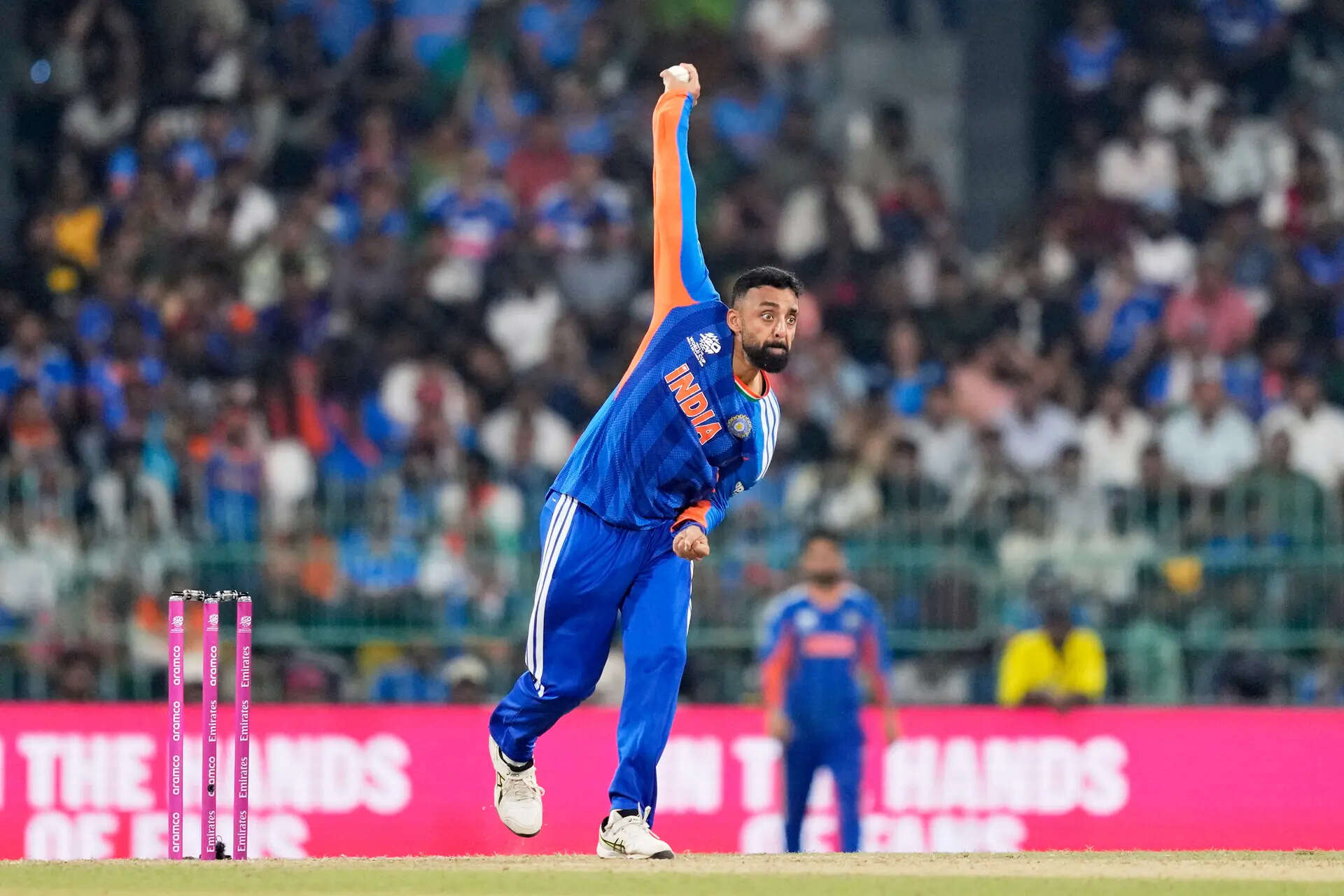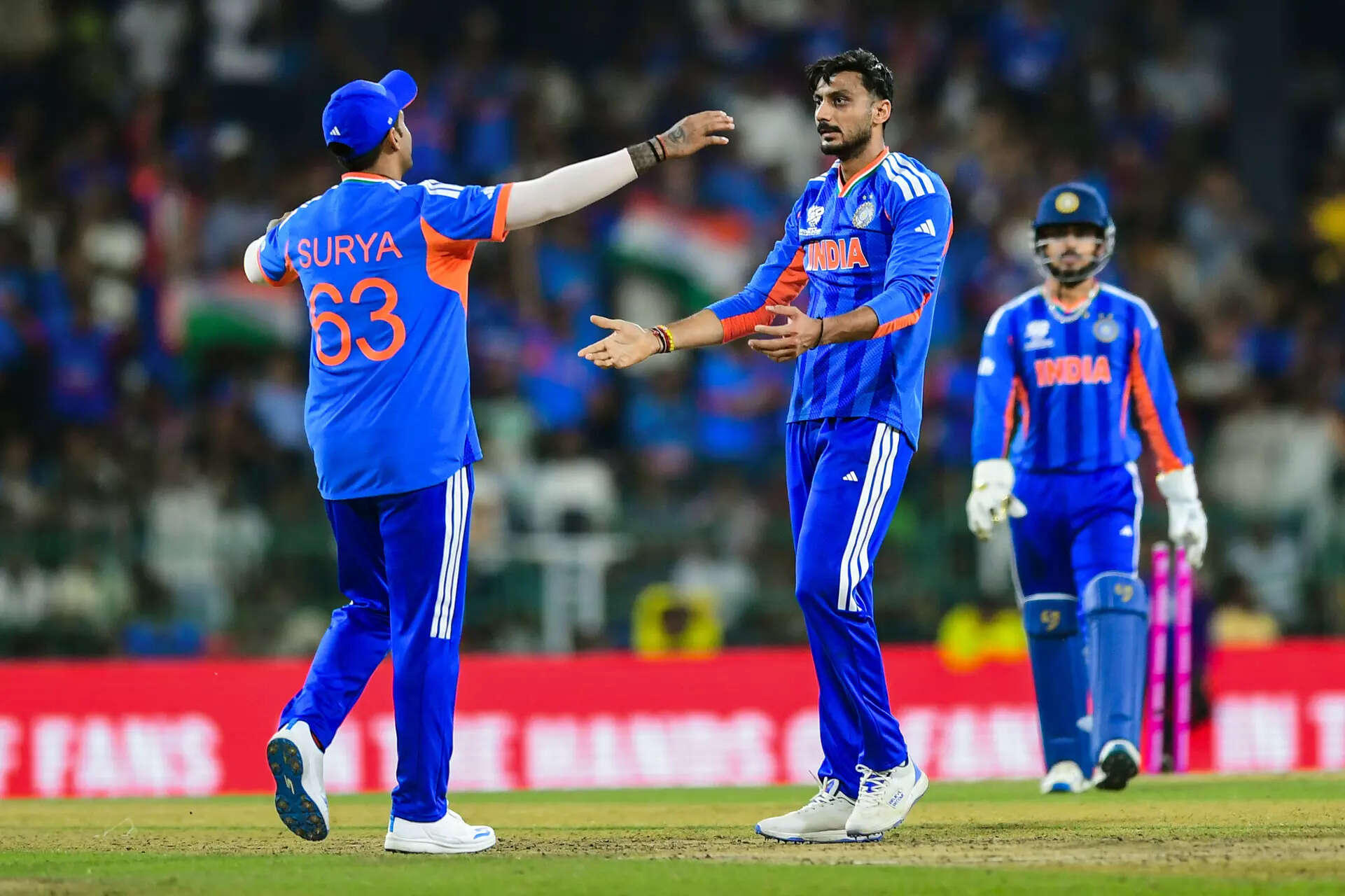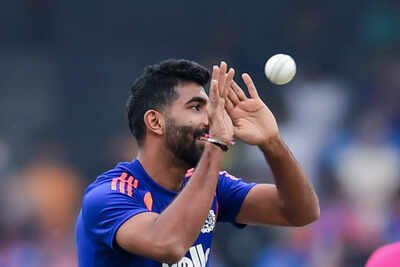TimesofIndia.com in Ahmedabad: Right from the build-up to the start of the T20 World Cup, all the noise has surrounded India’s famed batting line-up. The broadcaster has relentlessly hyped the 300-mark and even after four group stage games, the talk remains focused on Indian batting. Reasons may vary, but the subject has seldom changed and all pre-match discussions have revolved around Abhishek Sharma’s three ducks, Ishan Kishan’s heroics, the slowdown by Tilak Varma and Suryakumar Yadav, or the firepower in the lower order. Batting has remained the keyword and it has always been in this unforgiving format. Bowlers are often under appreciated based on their statistics — economy rate, wickets column — which rarely reveal the big picture or how they performed in the larger context of the match. A 35-ball fifty always trumps a 4-0-30-0 but the latter often makes the former look better than it has been.
While the batting unit has been the talk of the town, the potent bowling unit has slipped under the radar, but has continued to be the real deal. Varun Chakravarthy is the No.1 ranked T20I bowler, Arshdeep Singh has been a force in the format. Jasprit Bumrah continues to be brilliant, Axar Patel is smart and the two all-rounders — Hardik Pandya and Shivam Dube — are genuine options, not just fillers. Not to forget the additional options in Kuldeep Yadav and Washington Sundar. When India embraced the slam-bang mode in the format, their complete bowling attack provided underlying confidence. On days the approach backfired, bowlers were there to do the job. Like they were in that 2024 T20 World Cup final vs South Africa. Even on a bad day for Kuldeep and Axar, Hardik, Bumrah and Arshdeep combined to pull things back when they almost slipped away, helping India secure the elusive silverware. Now for them to defend the title, and become the only team to do so, the bowlers will hold the key. As the famous saying goes, “batters can win you matches but it’s the bowlers who win you tournaments,” and India have the most dangerous and well-rounded attack in the tournament.

Varun Chakravarthy is India’s highest wicket-taker so far in the T20 World Cup. (AP Photo)
When the questioning predictably focused on India’s batting — specifically their vulnerabilities against spin and the sluggishness in the middle overs — captain Suryakumar highlighted the efforts of the bowling unit’s and explained why he takes so much “pride” in them.“I take a lot of pride in my bowling unit. I know that on a given day, I always used to think that if we ever made 170, 175, or 180 in T20 cricket, then the high risk, high reward game we are trying to play, if we ever get stuck in 180, then we have so much good bowling that it can save the match, it can win that game,” said Surya.Even in their last group game against the Netherlands, the Indian team management wanted to prepare their bowlers for future challenges. The decision to bat first for the game was primarily made to give them a taste of dew.“When I had practiced here before the Netherlands game, there was very heavy dew one day before when we practiced. So we thought, why not bat first, take that pressure and then later put bowlers under little bit of pressure, bowl them under dew because we have not bowled under dew a lot. We didn’t face a lot of dew when we were at Wankhede, Delhi also. So it’s better they get an opportunity also to bowl in the dew and so that we are well prepared for it,” explained Surya.

Axar Patel, with skipper Suryakumar Yadav, celebrates the wicket of Pakistan’s Usman Khan. (ANI Photo)
The opposition has been busy planning for players like Abhishek, Kishan and Surya but significant attention is also paid to countering Bumrah & co. The different challenges which each of them bring to the table can be a nightmare for a batting unit to plan for, and South Africa have been no different. That familiar feeling exists because the two teams played in a bilateral series not long ago, and senior batter Quinton de Kock hoped the batters would apply their learnings to counter India’s x-factor Varun.“He’s (Varun) a good bowler, a very good bowler at the moment. And obviously he bowled really well against us in the series, like two months ago. Hopefully the guys have, after that series, just had a little bit more time to have a look at him, speak about how they’re going to play against him. So hopefully with their plans it comes off and if it doesn’t there’s a reason why he is probably the number one T20 spinner in the world. So we’ll have to see what we can do,” said de Kock on his former Kolkata Knight Riders teammate.Varun has an economy of 5.16, Bumrah is going at just 6 an over, Axar Patel is at 6.63, Kuldeep and Arshdeep at 4.66 and 7.60 respectively. Even the all-rounders Pandya and Dube have maintained control with an economy of 7.92 and 8.62 each. There are no freebies or releases on offer and it will take more than one bad day for this bowling unit to mess up a fixture. When serious business begins with the Super 8, the unsung bowlers will start hogging most of the limelight because they are the most crucial piece of the puzzle.





